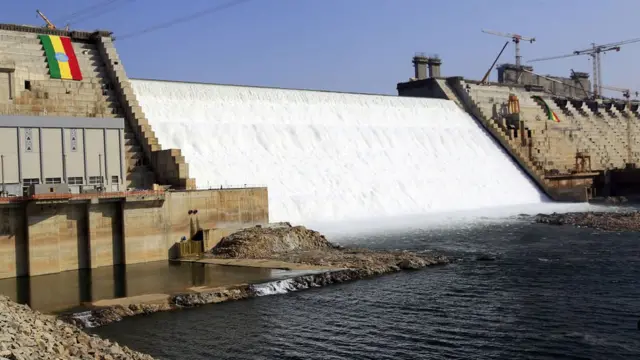Ethiopia’s Ambitious Dam Project Heightens Regional Tensions
Ethiopia is on the verge of officially opening a massive hydroelectric dam, which has become a focal point of rising tensions with neighboring Egypt. This ambitious project, known as the Grand Ethiopian Renaissance Dam (GERD), has been a source of dispute since its inception, with Egypt expressing concerns over water scarcity and potential impacts on the Nile, the primary water source for millions of Egyptians.
The Nile Dispute
The Nile River, historically crucial for Egypt’s agriculture and livelihood, sees more than 90% of its flow originating from Ethiopia. As Ethiopia moves forward with filling the dam’s reservoir, Egypt fears this will significantly reduce its water supply and disrupt its delicate ecosystem. Negotiations aimed at reaching a sustainable agreement on water usage have so far yielded little progress, leaving stakeholders apprehensive about the dam’s long-term implications for the region.
Local Reactions
Ethnic communities along the Nile have expressed mixed feelings regarding the dam. While some see it as a catalyst for economic development and energy independence for Ethiopia, others share Egypt’s concerns, highlighting the risks it poses to their own livelihoods and water access.
Luxury Development at a Holy Site Sparks Controversy
In another part of the region, plans to build a luxury tourism resort at the sacred site of Mount Sinai in Egypt are igniting fierce debates among locals and activists. Mount Sinai, revered for its religious significance in Judaism, Christianity, and Islam, is poised to undergo significant changes that may impact its natural beauty and spiritual essence.
A Clash of Interests
While proponents of the resort argue that it will boost the local economy and enhance tourism in the area, critics warn that such development could undermine the site’s historical significance. Environmental groups and religious leaders alike have rallied against the plans, urging the government to reconsider the implications of transforming this sacred ground into a commercial tourist destination.
Ongoing Humanitarian Crises in Sudan and Nigeria
In southern Sudan, villagers are resorting to desperate measures as they search for victims of a recent landslide. Save the Children reports that local residents are digging through the rubble with their bare hands, lacking access to basic tools and machinery needed for rescue operations. Their efforts highlight the dire humanitarian conditions facing many communities in the region, exacerbated by instability and conflict.
Violence in Nigeria
Meanwhile, Nigeria has witnessed another tragic escalation of violence as the militant group Boko Haram has been linked to a deadly attack in Borno State, resulting in at least 60 fatalities. Many of the victims had recently returned to the area, having fled from conflicts that displaced them for years. This devastating incident underscores the persistent insecurity facing communities in northeastern Nigeria, where extremists have wreaked havoc for over a decade.
Sporting Achievements Amidst Challenges
In a more uplifting turn of events, Tunisia has secured its place in the upcoming 2026 FIFA World Cup, marking a significant achievement for the team and its supporters. After clinching the top position in Group H through a recent victory over Equatorial Guinea, Tunisia joins Morocco as one of the two African nations to qualify for this prestigious tournament.
Summary of Recent News
| Event | Location | Impact |
|---|---|---|
| Grand Ethiopian Renaissance Dam inauguration | Ethiopia | Heights tensions with Egypt over Nile access |
| Mount Sinai resort development plans | Egypt | Sparks controversy over sacred site’s integrity |
| Landslide recovery efforts | Sudan | Desperate lack of tools for rescuers |
| Boko Haram attack | Nigeria | At least 60 killed in resurgence of violence |
| Tunisia qualifies for 2026 World Cup | Tunisia | Second African team to secure a spot |


